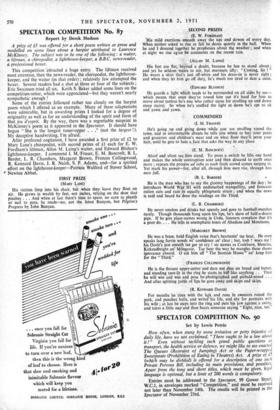SPECTATOR COMPETITION No. 87
Report by Derek Hudson
A prize of 1'5 was offered for a short poem written as prose and modelled on some lines about a harpist attributed to Laurence McKinney. The subject was to be one of the following : a waiter, a liftman, a chiropodist, a lighthouse-keeper, a B.B.C. news-reader, a professional boxer.
This competition attracted a huge entry. The liftman received most attention, then the news-reader, the chiropodist, the lighthouse- keeper, and the waiter (in that order) ; relatively few attempted the boxer. Several readers had a shot at three or four of the subjects ; Eric Swainson tried all six. Keith S. Baker added some lines on the competition-setter, which were appreciated—but they weren't nearly sympathetic enough !
Some of the entries followed rather too closely on the harpist poem which I offered as an example. Many of these adaptations were admirable, but in awarding prizes I looked for a degree of originality as well as for an understanding of the spirit and form of that jeu d'esprit. By the way, there was a regrettable misprint in McKinney's poem as it appeared in the Spectator. It should have begun " She is the longest tuner-upper . . ." (not the largest !). My deceptive handwriting, I'm afraid.
After profound cogitation, I have awarded a first prize of £2 to Mary Lane's chiropodist, with second prizes of £1 each for E. W. Fordham's liftman, Allan M. Laing's waiter, and Edward Blishen's lighthouse-keeper. I commend I. M. Fraser, E. M. Bancroft, B. L. Barder, L. R. Chambers, Margaret Brown, Frances Collingwood, R. Kennard Davis, J. R. Naish, S. P. Adams, and—for a spirited effort on the lighthouse-keeper—Patricia Walford of Stover School, • Newton Abbot. FIRST PRIZE (MARY LANE)
His victims limp into his chair, but when they leave they float on air. He grows in wealth by feet, not inches, relying on the shoe that pinches . . . And when at last there's time to spare, no corn to plumb or nail to pare, he reads—no, not the latest Runyon, but Pilgrim's Progress by John Bunyan.
SECOND PRIZES (E. W. FORDHAM)
His mild exertions smooth away the ups and downs of every day. When neither asked to rise or fall he dozes quietly in the hall. When he and I descend tqgether he prophesies about the weather ; and when at night we rise again be comments on the recent rain.
(ALLAN M. LAING)
His feet are fiat, beyond a doubt, because he has to stand about ; and yet he seldom wants to stir, but murmurs idly: "Coming, Sir ! " He wears a shirt that's just off-white and his dress-tie is never right ; and when they let him go off duty, he's much too tired to date a cutie.
(EDWARD BLISHEN) He guards a light which tends to be surrounded on all sides by sea— which means that once they've rowed him out it's hard for him to move about (unless he's one who rather cares for strolling up and down steep stairs). So when he's snuffed the light at dawn he's apt to sit and yawn and yawn.
COMMENDED (I. M. FRASER) He's going up and going down 'while you are strolling round the town, and in interminable chants he tells you where to buy your pants and groceries and children's wear and on what floor they'll perm your hair, until he gets to hate a face that asks the way to any place
(E. M. BANCROFT)
Aloof and silent see him stand. To press a switch he lifts one hand and makes the whole contraption soar and then descend to earth once more ; repeats the process ad infin as each fresh crowd comes surging in. Yet mark his power—for, after all, through him men rise, through him men fall.
(B. L. BAADER) He is the man who has to say the gloomy happenings of the day ; he introduces World War B1 with undisturbed tranquillity, and forecasts ration cuts and rain in equally phlegmatic strain ; and when the news is said and heard he does the readings on the Third.
(L. R. CHAMBERS)
He never smokes and drinks but sparely and goes to football-matches rarely. Though thousands hang upon his lips, he's slave of half-a-dozen pips. If he gets place-names wrong in Urdu, listeners complain that it's a poor do.... He tells in unemphatic tones of Abadans and Morrisons.
(MARGARET BROWN)
He was a braw, bold English voice that's heartenin' tae hear. He even speaks lang furrin words wi' confidence an' clear ; but, losh ! wars me ! his Doric's just eneuch tae gar ye cry ! sic names as Cockburn, Menzies, Kirkcudbright an' Milngavie. Tae hear the way he mangles these shows ignorance absurd. 0 tak him aff " The Scottish Home' an' keep him for the " Third."
(FRANCES COLLINGWOOD)
He is the fiercest upper-cutter and dare not dine on bread and butter, and standing spot-lit in the ring he starts to biff like anything .. Then he will win and win and pose be-photographed and piebald-nosed . . . And after splitting yards of lips he goes away and skips and skips.
(R. KENNARD DAVIS)
For months he rises with the lark and runs in sweaters round the park, and punches balls, and writes his life, and sits- for portraits with his wife ; at last he steps into the ring and puts his jaw against a swing, and takes a little nap and then hears someone saying "Eight, nine, ten."


































 Previous page
Previous page